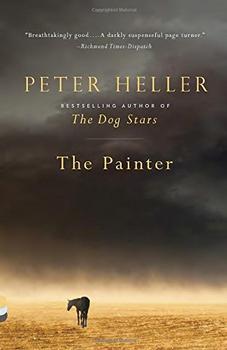Summary | Excerpt | Reading Guide | Reviews | Beyond the book | Read-Alikes | Genres & Themes | Author Bio

Jim Stegner, the rugged yet highly sensitive and artistic narrator of Peter Heller's second novel, The Painter (first novel, The Dog Stars), moves to Paonia, Colorado after suffering the loss of his beloved daughter, separating from his hot-tempered lover, and divorcing out of an uninspiring marriage. He wraps himself in the beauty of the rivers and mountains, and – through a combination of fishing and painting – tries to defuse the rage and sadness he always carries. He explains: "This is my new home. It's kind of overwhelming how beautiful...A good place I guess to make a field of peace, to gather and breathe."
But despite his sincere intentions to lay low and regroup, Stegner can't help but cause trouble when he sees an injustice that reignites his fuse. Dellwood Siminoe, a local hunter and jerk-at-large is abusing a tiny horse, "swinging the club against the little mare like she was a piñata." Jim loses all self-control. His impulsive, violent behavior starts a domino effect he can't stop, and he quickly finds himself in deep, deep trouble.
The complexity of Peter Heller's characters, specifically Stegner, and his ability to integrate art with violence, poetry with addiction, and nature with deep introspection, makes The Painter an absolutely vibrant read. The line between good and bad is not clearly defined, and detestable deeds often have logical explanations. The first-person narration allows readers to get inside Jim's thoughts (which are often in great contrast to his actions), and his short, fragmented sentences breathe life into the narrative. He is a Hemingway-esque character – outdoorsy, tough, alcoholic – but with a softer side. He seems secure in his masculinity, which allows him to explore his feelings without being threatened or overly macho. He often recalls tender moments with his daughter, gets lost in the beauty of small creatures, and recites poetry to himself. In this way, Heller creates an interesting, three-dimensional character who is riveting.
The setting for the story, the gold and purple landscape of the Southwest (Colorado and New Mexico specifically), plays an important role in The Painter. Heller takes his time describing the rivers and trees, the simultaneous grandeur and delicacy of nature. He writes:
This is how I healed. Or didn't. …We turned off the highway and rattled slowly up the gravel road and into the heart of the canyon. The walls closed in above us, the high blue of the sky deeper, deep and dark like a river is deep. The highest rock at the rim was a strip of fire, holding the last long sun. …We drove with the windows down and the wind came down against us bringing a night's cold and blowing the last rattling leaves off the cottonwoods. They blew into the river and floated slowly in the pools, pushed by the wrinkles of the wind, singly and in sad fleets.
Heller's poetic language slows the narrative and gives it a quiet, peaceful feel, in between bursts of intense plot development that keep the story moving. The effect isn't jarring at all, but allows readers to savor each scene. Though the plot and subject matter are quite dark, the novel isn't one of despair. Humanity, redemption, and forgiveness lie at the heart of the story, and each character acts nobly within his world view, no matter how distorted it might be.
Heller's respect for art and literature as means of expression, his gorgeous descriptions of the landscapes, his driving plotline, and his complex characters all combine to create a thoughtful and deeply satisfying read. I recommend The Painter to people who appreciate the outdoors, to people who could spend twenty minutes contemplating one painting in an art museum, and to people who prefer gray spaces to black and white. Two thumbs up.
![]() This review was originally published in The BookBrowse Review in May 2014, and has been updated for the
March 2015 edition.
Click here to go to this issue.
This review was originally published in The BookBrowse Review in May 2014, and has been updated for the
March 2015 edition.
Click here to go to this issue.

If you liked The Painter, try these:

by Nicholas Petrie
Published 2016
An explosive thriller debut introducing Peter Ash, a veteran who finds that the demons of war aren't easily left behind ...

by CB McKenzie
Published 2016
The newest winner of the Tony Hillerman Prize, a debut mystery set in the Southwest starring a former rodeo cowboy turned private investigator, told in a transfixingly original style.
Your guide toexceptional books
BookBrowse seeks out and recommends the best in contemporary fiction and nonfiction—books that not only engage and entertain but also deepen our understanding of ourselves and the world around us.